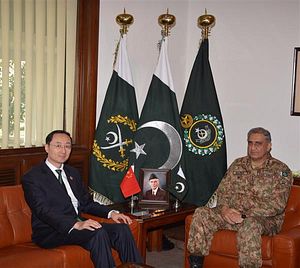Last Friday, Sun Weidong, China’s envoy to Pakistan, met Pakistani Chief of Army Staff General Qamar Javed Bajwa at the Pakistani Army’s General Headquarters (GHQ) in Rawalpindi.
The meeting was publicized by Pakistan’s Inter-Services Public Relations (ISPR), which noted in a press release that Sun “acknowledged and appreciated Pakistan Army’s efforts in combating terrorism and militancy. ”
Sun “also conveyed China’s satisfaction on security arrangements for CPEC (the China-Pakistan Economic Corridor),” the ISPR release noted, adding that “other matters of mutual interest including regional security were also discussed during the meeting.”
Sun’s meeting with General Bajwa wasn’t particularly unusual. The Chinese envoy met with General Raheel Sharif, Bajwa’s predecessor, at the GHQ as well.
The last publicized meeting took place in June 2016. A Pakistani military statement on that meeting noted that “[m]atters of mutual interest, including regional security and China-Pakistan Economic Corridor, came under discussion.”
Ever since the $46 billion China-Pakistan Economic Corridor was announced during Chinese President Xi Jinping’s April 2015 visit to Pakistan, security has been a major concern for China. The Pakistani Army set up a special division specifically to provide security for Chinese workers in Pakistan involved in CPEC-related projects.
CPEC, once completed, will streamline infrastructure along the length of Pakistan, connecting the mountainous northern border of the country alongside China’s western province of Xinjiang, with the Arabian Sea via the port terminus of Gwadar.
For China, CPEC presents a particularly significant undertaking under the “One Belt, One Road” set of initiatives Xi announced back in 2013.
Once completed, China will possess a land route to the western Indian Ocean through Gwadar, allowing it to forgo sea-based commercial routes through strategic choke points in the eastern Indian Ocean and the South China Sea.
Regular meetings between China’s top diplomatic envoy and Pakistan’s chief of army staff underline Beijing’s concerns about security challenges delaying CPEC.
As Bahauddin Foizee observed in The Diplomat shortly after Bajwa’s appointment as Sharif’s replacement last November, the new Pakistani army chief is particularly experienced in security matters in the restive southern Pakistani province of Balochistan, which hosts the Gwadar port, as well as the northern frontiers of CPEC, which encompass Gilgit-Baltistan and Pakistan-administered Kashmir.
Sun’s regular meetings with Raheel Sharif and now Bajwa are additionally interesting when viewed through the prism of reports last year that China was privately expressing its unhappiness with how CPEC was being managed. A report in Dawn last July underlined that Beijing saw the involvement of “various ministries,” per an unnamed source, as a source of unnecessary delay.
Additionally, the Chinese envoy’s direct consultations with Pakistan’s army chiefs highlights the extent to which CPEC implementation and security could serve as a wedge between Pakistan’s civilian and military leadership. With an estimated 10,000 Chinese citizens working on different aspects of CPEC, China has increasingly shown a preference for the Pakistani military’s impulses on CPEC implementation.
































